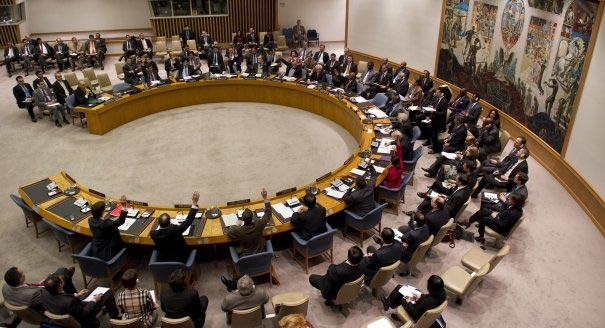The main source of Russian aggression is a profound mistrust of the West and the firm belief that it intends to inflict a “strategic defeat” on Russia. As long as this fear persists, the war will not end.
Tatiana Stanovaya
{
"authors": [
"David Rothkopf"
],
"type": "legacyinthemedia",
"centerAffiliationAll": "",
"centers": [
"Carnegie Endowment for International Peace"
],
"collections": [],
"englishNewsletterAll": "",
"nonEnglishNewsletterAll": "",
"primaryCenter": "Carnegie Endowment for International Peace",
"programAffiliation": "",
"programs": [],
"projects": [],
"regions": [
"North America",
"East Asia",
"Caucasus",
"Western Europe"
],
"topics": [
"Political Reform",
"Economy",
"Climate Change",
"Security",
"Foreign Policy"
]
}
Source: Getty
The world has gone from a golden moment of optimism about multilateralism to grappling with the dark frustrations of aimless muddlelateralism.
Source: Foreign Policy

We have gone in a matter of not too many months from a golden moment of optimism about multilateralism to grappling with the dark frustrations of aimless muddlelateralism. Hope is now the thing we are trying scrape off the bottoms of our shoes while Europe, the Middle East, and our entire global ecosystem shudder from the after-effects of a world that seems to be lacking effective global institutions.
Was it only in 2008 that George W. Bush, at the height of the financial crisis, invited the G-20 to get involved as the leading mechanism for coordinating an international response? Was it only months later that new President Barack Obama spoke of seeking multilateral solutions, of trying to create an international system that reflected the new global power structure? Wasn't it not too much after that when Libya was offered up as an example of a new model for how America and its allies would work together to get things done?Yet now, evidence is everywhere that the promise of those moments has been undone. Look at the still festering eurocrisis, at bleeding Syria, at the one-step-forward, two-steps-back pace of the Iranian nuclear negotiations, at the low hopes for material progress at the G-20 meeting in Los Cabos, and at the perplexing spectacle of Rio+20 that I am now attending, an event that is likely to be both one of the largest and least consequential in the history of the United Nations.
This certainly does seem to be a G-Zero moment, to borrow a phrase from the Eurasia Group's Ian Bremmer. But will it lead to a period of protracted global rudderlessness? Or will this depressing panoply of multilateral misfires be precisely what we need to trigger the even deeper crises that will finally deliver home the message that we need better global governance sooner? (That one's for you, silver lining fans.)
One reason today's seeming global power void is so frustrating is that we actually live at or near the moment of the world's greatest aggregate wealth, a time when more nations possess more engines and instruments of real power than ever before.
Our problem is not that the biggest powers are incapable of action to address current problems. It's that just when the promise of a new post-Cold War, post-single-superpower era of collaboration among nations seemed to be greatest, many of the big powers have revealed themselves to be unwilling to assume the responsibilities of true global leadership -- of motivating, cajoling, inspiring, intimidating, confronting or blocking actions by other powers. It's not so much that we are in a G-Zero world as it is that most of our leaders are zeroes.
A few of those bear special responsibility for taking the bloom off the multilateral rose. Angela Merkel has steered a course for Germany that has alienated much of Europe and put the European experiment at risk. She has implicitly suggested that Europe exists to serve the interests of Germany and, more disturbingly, that the middle and lower classes of the struggling countries at Europe's periphery deserve to work for the next decade or so to ensure that Europe's bankers don't suffer their consequences of their irresponsible lending practices. Russia and China have blocked action in Syria on the premise that pushing out Bashar al-Assad would likely open the door to worse. They fully realize that their own governments might one day be targets of the kind of uprisings facing the regime in Damascus and they want to reserve their sovereign right to rough up their people however they may choose.
Obama has engaged with virtually all of these situations to little effect, offering much rhetoric but not much shoulder. He may well be appropriately focused on economic issues at home, but there is no denying that at the G-20, in the UN, at the world's international financial institutions, and confronting key challenges, no one is touting the transformational presence of Obama the multilateralist as they did a couple of years ago.
One sign of this is the G-20 meeting in Los Cabos this week, which has an official agenda that is almost laughably remote from the big issues of the day. In the past year, the group has played a much smaller role than was envisioned at the height of the financial crisis -- a reality that will be underscored as the reactive, last-minute agenda to address Europe's continuing crisis dominates the meeting, mostly through a flurry of bilateral leader conversations on the perimeter of the official event. There will be strong language, lectures to Europeans and pushback from them, signs of the deepening tensions between the United States and Russia, and a few essentially meaningless gestures that will do little to resolve anything ... and then will shift the main venue for addressing the global economic crisis back to the G-7, the European Union itself, and the other fora that have supplanted the unwieldy G-20 over the past three years.
Still another sign of the problem is that the U.N. meetings here in Brazil will draw more than 50,000 people and more than 100 heads of state, but many of the most important ones will be missing -- including Obama. The process for producing its primary communiqué was described to me by one senior U.S. official as a "hopeless clusterfuck." (And speaking of signs, one that seemed to hit the nail on the head could be found stuck into the beach along the sidewalk in Copacabana. It said: "Rio+20, to decide to not decide is the worst decision of all. You are putting not only nature, but lives at risk.") Failure to address the climate issues here in Rio will almost certainly be seen by history as the single greatest failure of the current multilateral system and today's leaders -- far outstripping the issues currently dominating the headlines, from Greece to Egypt, the eurozone to Syria.
The general sense of the drift away from the stronger multilateral institutions we so clearly need to manage our climate or regulate global markets or take on international threats like proliferation of weapons of mass destruction has been going on for months. The crisis in Europe has fed it. The lost hopes of the Arab Spring fed it. The fact that Libya was so deliberately sui generis and that Syria proved it has fed it. The U.S. hypocrisy in clinging to an antiquated system of choosing the next leaders of the IMF and the World Bank fed it. And the ineffectiveness of the ongoing nuclear negotiations with the Iranians has fed it.
Nor are the momentarily encouraging Greek election results, despite shoot-from-the-lip cable TV pronouncements declaring them a victory for Europe and the eurozone, a sign that multilateralism is making a comeback. Market reactions demonstrated that. And besides, Greece is -- shock headlines aside -- a side show. Much larger debt crises in Spain and Italy (and perhaps France) loom ominously. But the real problem is with the European banking system itself, which is plagued, top to bottom, by bad debts -- starting with the lousy home loans made by Spanish cajas and extending up to the European Central Bank's asset base, much of which is comprised of loans that have yet to truly be marked to their diminished market value.
My instinct is that the Greek result will in any case be seen as a harbinger. Neither the EU nor the eurozone is going away. More likely, both will be stronger as public recognition that they are needed and must be further strengthened through addition of fiscal union and tougher banking regulations grows amid the long, slow gaze into the abyss that would be created by their potential absence. (As for Greece, it may leave the eurozone, but it will leave a eurozone stronger for the circumstances of its departure.)
Similarly, whether it is the failure to stop Iran's nuclear march or the failure to stop Assad in Syria or the inability of the World Bank to stabilize economies and help create jobs, or whether it is the inevitable recognition that our planet actually demands cooperation among all nations to preserve its climate, I continue to believe that circumstances will be more effective than our current weak crowd of leaders at persuading the world that we need the strong global governance that seemed closer two years ago than it does today.
In other words, it will get worse before it gets better. What we are seeing today is the kind of failure of leadership likely to produce consequences so disturbing that ultimately they will help move us past the multilateral rhetoric of idealists to the urgency that comes of clear-eyed realism about what works, what doesn't, and what we really need. Multilateralism will ultimately flourish not because it is more equitable but because we cannot solve global problems without it. Today's leaders -- through their inaction and missteps -- may inadvertently be doing more to ensure cooperation among their successors than they did when they actually seemed to care about such issues earlier in their careers.
Carnegie does not take institutional positions on public policy issues; the views represented herein are those of the author(s) and do not necessarily reflect the views of Carnegie, its staff, or its trustees.
The main source of Russian aggression is a profound mistrust of the West and the firm belief that it intends to inflict a “strategic defeat” on Russia. As long as this fear persists, the war will not end.

Tatiana Stanovaya
Europe’s interests in Syria extend beyond migration management, yet the EU trails behind other players in the country’s post-Assad reconstruction. To boost its influence in Damascus, the union must upgrade its commitment to ensuring regional stability.


Bianka Speidl, Hanga Horváth-Sántha
European democracy support strategy in 2025 prioritized protecting democratic norms within Europe. This signals the start of a structural recalibration of the EU’s approach to democracy support.



Richard Youngs, ed., Elena Viudes Egea, Zselyke Csaky, …
Despite its reputation as an island of democracy in Central Asia, Kyrgyzstan appears to be on the brink of becoming a personalist autocracy.

Temur Umarov
The Russian army is not currently struggling to recruit new contract soldiers, though the number of people willing to go to war for money is dwindling.

Dmitry Kuznets